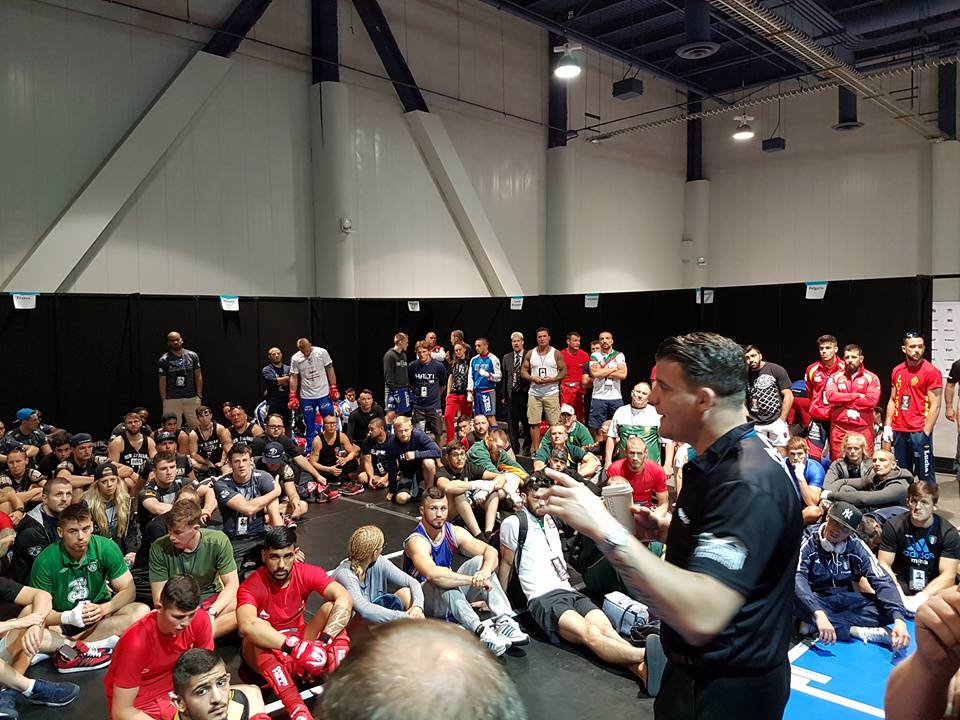Pictured above: Head official Marc Goddard briefs over 200 competing athletes at the 2016 IMMAF World Championships in Las Vegas, USA. IMMAF’s pioneering Talent Pathway and Development System (or “progression scheme”) introduces an essential framework for MMA, in line with the required certification pathways of all regulated sports. As of February 2017, the MMA Talent Pathway and Development System covers the education and certification of participants from a purely recreational level through to amateur and professional. The holistic system also provides for coaches as a unified training and licensing programme targeted at those with different levels of knowledge and experience. It has been designed to work in conjunction with IMMAF’s existing Progression Scheme for Officials, providing a wrap around framework that ensures the safety of a competitor across both gym and competitions. The implementation of participant levels and professional certification for coaches and officials is considered a necessity for safe conditions and proper regulation of sport. It is indeed a requirement for acceptance by sports authorities and governments worldwide. In the spirit of MMA, while the scheme aims to provide a core, unified set of fundamentals in the interests of setting safety standards, these have been designed with scope for development according to each coach’s personal style and background. For Participants In order to progress through the different levels of the Talent Pathway, a participant is expected to show competency in core MMA skills, such as a jab, roundhouse kick or double leg take-down for use in an MMA match. Participants must reach a particular level in order to be able to compete firstly at Amateur level and then later at Professional level. Although special exceptions can be made, there are stipulated minimum time periods that a student must remain at a level before he/ she can progress. For Coaches The MMA Pathway and Development System – Coaches Licensing Course underwent its pilot launch on February 25 & 26 in Suffolk, UK. Course content comprised the first of 4 proposed modules and was attended by participants from UK, Ireland, Northern Ireland, France, Portugal, Germany, Italy and Cyprus. Attendees also included representatives from IMMAF’s Coaching Committee, who were invited to review and assess the syllabus. The interactive 2-day training was designed to introduce a nominated Coach Education Development Officer from different countries to the Talent Pathway and Development System for Participants of MMA. Coach Education Development Officers will be awarded one (1) free Coach Education Development Officer License, and will be mandated and supported by IMMAF to implement the MMA Talent Pathway & Development System and first Level Assessments for participants (level 1, level 2 etc) within the national Federation. The pilot workshop provided the opportunity for a diverse group of coaches to discuss course content and structure. With input from expert coaches from some the sport’s most developed regions the progression scheme provides guidelines for nations where the grass roots foundations are only just being established. The involvement of experienced coaches, some who have worked to a high level with prominent athletes and youth development enabled a bringing together of shared insight with, for example, IMMAF’s youngest national member (the Cyprus MMA Federation). This is an example of unified comradery between nations in developing unified MMA regulation under IMMAF . Furthermore, unique e-learning material will soon be on offer, providing information on policies and standard procedures recognised in each IMMAF member nation. The Syllabus video with technique breakdowns will be available on the MyNextMatch platform. Having taken part in the Talent Pathway discussions, IMMAF CEO Densign White commented: “We want this to be a neutral and collaborative effort with worldwide input. Progression scheme courses will be hosted by the national IMMAF member of where it is taking place. This affords the opportunity for adaptation based on the fundamental guidelines provided. The sport needs this and we can’t delay anymore.” “It’s holistic,” explained IMMAF president Kerrith Brown. “The scheme caters for all areas of safe sport from recreational participation through to professional coaches. It is one of the most essential factors of sport development and regulation. Other people developed various pathways for MMA but we are unique in setting a universal standard.” Further workshops and module reviews are scheduled to take place throughout 2017 for completion ahead of the 2017 IMMAF World Amateur Championships. For Officials (referees and judges) Designed and conducted by internationally renowned UFC referee Marc Goddard, the IMMAF Progression Scheme for officials launched in 2015 with the first international certification course for experienced referees taking place in Prague, Czech Republic. The purpose of the course is to further IMMAF’s international standard for a unified understanding of rules by educating, assessing and expressing the responsibilities to officials from IMMAF member federations from around the globe. Experienced officials from all over the world have experienced the approved seminar content and insightful group discussions followed by a multiple choice questionnaire and practical assessment that takes place through mock sparring sessions. Successful course graduates are issued a banding based on experience and time served, affecting the level of competition of which they can officiate from domestic amateur to international IMMAF championships and professional bouts. Graduates are then empowered to lead their own domestic certification courses via their national IMMAF member federation/association. There are a number of ways in which the three progression pathways integrate: For example, the longer proposed vision is that Officials may feed into the assessment system for coaches by monitoring participants’ skill levels in competition. Officials could then raise concerns with their national governing body where a participant does not seem adequately skilled to safely compete in combat sports.]]>

